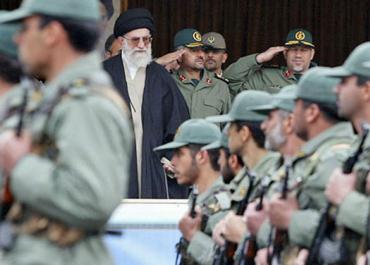
 ‘Leader worried about upcoming elections’
‘Leader worried about upcoming elections’
A close aide to Iran’s Supreme Leader says that authorities are unable to put the leaders of the Green Movement on trial because of their followers.
Speaking to the Fars news agency, Ali Saeedi, the Supreme Leader’s representative to the Islamic Revolutionary Guards Corps, said that it was not possible to take 2009 presidential candidates Mir Hossein Mousavi and Mahdi Karroubi to court “because they have supporters and followers” as well as “a few turban-heads [clerics] who continue to back elements within the sedition.”
“Sedition” is a term frequently used by officials to refer to the massive protests that erupted following the June 2009 presidential race which resulted in the re-election of Mahmoud Ahmadinejad as president.
In mid-February, Karroubi and Mousavi, who spearheaded the opposition Green Movement since the rigged election, were placed under an illegal and arbitrary house arrest after calling for protests in solidarity with the Arab Spring. Thus far, no formal charges have been put forth against the two men. Human rights groups say their continued captivity and maltreatment is inconsistent not only with human rights provisions, but also with Iran’s own constitution.
Meanwhile, Mehdi Taeb, commander of the Ammar garrison of the IRGC, recently claimed that the men themselves, fearing their “safety,” had requested to be placed under house arrest!
“Some,” Saeidi continued, “ask me, ‘Why don’t they try Mousavi and Karroubi?’ The reason is that they have … supporters and I cannot mention the names of their followers.”
In what appeared to be a scathing critique directed at former president Hashemi Rafsanajani, the cleric said that some amongst Iran’s political elite “remained silent before the sedition or approved of were satisfied with it … He who is silent is just like he who approves of it.”
“A few days ago, the grey man had said that ‘I won’t distance myself from these two individuals [Karroubi and Mousavi]. These are good people.’ Now let’s see how many more turban heads we have who still support elements within the sedition.”
Saeidi’s comments come as the regime braces for parliamentary elections, which are to be held in March. Analysts predict a record-low turnout, mainly due to the fact that Iran’s major pro-reform parties, including the Islamic Iran Participation Front (IIPF) and the Mujahedin of the Islamic Revolution Organisation (MIRO), have decided to boycott the upcoming elections, calling it a “theatrical” display aimed at deceiving the population.
Candidates for the 2 March elections had until 30 December to register for the forthcoming vote. According to Interior Minister, Mostafa Najjar, 5,283 candidates signed up for the elections, close to 2,300 fewer than the same figure four years ago.
During Friday prayers, hardline cleric Ahmad Khatami spoke against the reformists’ calls for an all-out boycott, saying that people had both the “right and responsibility” to partake in elections.
“We are on the verge of an important election race, and the Supreme Leader has warned of the possibility of the elections being faced with a security challenge,” Saeidi explained.
“I do not recall the Supreme Leader ever warning about [the elections] becoming a security concern, but he has done so with regards to the upcoming elections,” Saeidi continued, suggesting Khamenei was “worried” about the “security” dimensions of the March vote.
“Remnants of the sedition might want to stir up trouble. It’s also possible that foreign [powers] will take advantage of the opportunity, as well as weaknesses in the executive and supervisory branches, in order to prepare the groundwork for [security challenges],” the IRGC official argued.
On Sunday, IRGC commander, General Muhammad Ali Jafari, told the semi-official Mehr news agency, “The enemy will use the Majlis elections as an excuse, and most certainly seeks to revive riots and social unrest in Iran [like in 2009]. It’s been plotting to do this for a while now.” He expressed hope however that the population’s participation in the elections would “neutralise” the foreign “plot.”
In mid-December, Ali Mohammad Gharibani, president of Coordination Council of the Reformist Front, announced that the country’s pro-reform factions would not participate in the March parliamentary race. He said the council had “decided not to present a unified list [of candidates] and not to support anyone [in the race].”
Months earlier, former reformist President Mohammad Khatami had set conditions for the reformists to participate in the Majlis elections, including: the release of all political prisoners; free and competitive elections; and freedom for political parties and the press.
Last week, Khatami backed the Coordination Council of the Reformist Front, saying, “My opinion is the same as the council’s, which is that the reformists cannot and must not have candidates and a unified list in the elections.”
“I don’t speak on behalf of anyone. I think that all indicators suggest that we must not take part in the elections.”
Click HERE to read more.

Be the first to comment